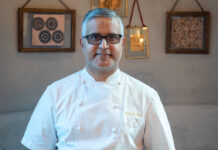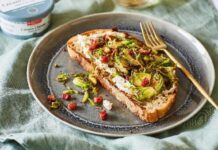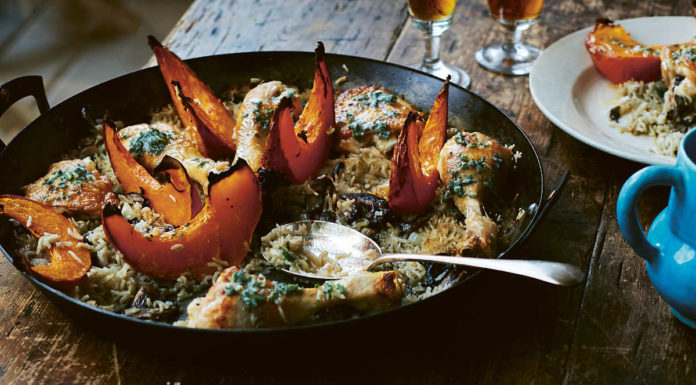Cookbooks take time to write. There’s recipe testing to perfect, measurements to clarify, photos to style and snap.
With Restore, chef Gizzi Erskine’s latest cookbook, she also had to keep pace with science – a high speed, ever-changing avalanche of the stuff (“It’s moving at a beat daily”). After four years of work, the result is both a recipe collection and, she hopes, “an accessible translation of what the hell’s going on in the world at the moment”.
Restore: A Modern Guide To Sustainable Eating, encompasses dinner (of course), but also the food industry and its myriad problems, all the while drawing on environmental and agricultural science.
Erskine’s last cookbook Slow, had its foundations in the slow food movement, in line with a growing public awareness around good produce and making the best of ingredients, but it came before wider conversations around farming practices and the intrinsic relationships between food and planet. Restore she says, is the natural next progression, and it has, she admits, “been quite a feat”.
“When you’re battling trying to keep up with something that, suddenly, has gone from being a quite slow progressive movement to suddenly, bosh! There’s so much to learn,” she buzzes. “We filed this book four months ago and I’m already like, ‘Ohhhh, there’s still so much to say!’”
A huge amount of research has gone into it, and although “produce has always been what gives me thrills,” the crux of Restore is finding a balance between “really delicious recipes and making a practical guide for learning how to be an ethical, agriculturally savvy eater”.
Alongside recipes for lamb neck stew, salt-baked celeriac, braised courgettes, green shakshuka, black pepper crab and cauliflower pasta, London-born Erskine, 41, examines the environmental concerns around monocropping, explores how to work with waste, and addresses issues within the meat and dairy industries.
“I’m a meat eater, but I’m really a consciously minded one,” she explains. “I believe that people go out to be more like this nowadays full stop, but I think meat has got such a bad reputation; people don’t recognise that it is probably the thing that’s going to save the world.
“It might not be what everyone wants to hear, but let’s not forget that over 80% of this country are meat eaters. It’s still the priority here, so if we’re going to eat meat, let’s do it consciously, in an agriculturally sound way, that avoids wasting lives.”
While the book has many a vegan and vegetarian recipe in it, Erskine does take umbrage with the idea “we’ve been sold that the only solution is veganism, or eating a plant-based diet,” when this too would likely have its own agricultural repercussions.
“I’m not promoting eating more meat as long as it’s ethical,” Erskine continues. Instead, it’s about understanding where your food has come from, and what’s been involved in getting it to your plate.
Regardless whether it’s meat or veg, find out how it’s produced she urges. Find out if regenerative farming practices are in place. And with meat especially, eat the whole animal. “I love offal,” says the St JOHN restaurant alumni. “I find it weird that a lot of people find it really alarming…”
She’s also all for allotment culture: “We have a window box garden – you can grow anything in a window box.” In fact, during lockdown, she and her neighbours wanted to see if they could become completely self-sufficient. “We started fermenting everything,” says Erskine happily. “It’s really fun.”
Restore in fact starts with a chapter on pickling and fermenting, but there’s much more going on behind Erskine’s recipes for homemade vinegars and gochujang (Korean red hot pepper paste), than just delicious fizziness and nifty, long-lasting preservation techniques.
“One of the main reasons I wrote the book was because we were, not laughing – it’s not funny – but tongue-in-cheek laughing at how the whole world was starting to collapse. It was pre-Brexit, pre-Boris, pre-all of this insanity,” she recalls.
At the time, just over four years ago, Erskine felt we were living in a “pre-apocalyptic world”, where trade was set to change, awareness of the environmental crisis was only just beginning to really take hold, and footage of the California wildfires was starting to shock online. All these things have just accelerated since. “And then COVID hit,” she says.
“We were thinking, ‘What would happen if you couldn’t trade? And what are those ingredients you couldn’t live without [if you couldn’t get hold of them]?’” The fermentation chapter is her answer and her cure; it’s filled with kimchi and sauerkraut, but also covers “making olives, to making your own fish sauce and white miso”.
“If you learnt how to make sourdough during lockdown, these are the things you might find interesting, further down the road,” says Erskine, adding: “That was such a great example of what we’re talking about – the country locks down; we run out of flour. This is a very real thing.”
When it comes to what we can do as individuals in regard to sustainable and ethical eating, it’s a matter of looking at how meat and veg is produced and demanding better. “If we really want to save the world, we’ve all got to be involved,” she says, and to “protest this using our own wallets”.
However, Erskine is fully aware of the socio economics involved, and the fact people are in very different positions, dealing with wide-ranging pressures.
While pandemics, climate change and increased food poverty only exacerbate existing inequalities. “It’s all good and well me sitting here, having a lovely life – and this is my passion and this is what I want to invest in – but the truth is, most people will struggle eating like this, not only if they can’t afford it, but if they can’t find it, because accessibility is the key thing,” says Erskine frankly.
“The foods I’m suggesting are well made, and they come at a cost, but I’m also saying that I would rather get a big cut of something special and let it go into several dishes and support agriculture.”
There is, undoubtedly, a lot of work to be done. Does she think we stand a chance though, at reframing how we eat in order to restore and help revive the planet? “Everything’s mental, but I do believe that there is good in the world,” says Erskine. “All the best revolutions have come from the real people, and there could be a revolution from people’s homes, I really do think that.”
I’m gutted I can’t throw a proper book launch this year, but I think I’ve come up with one better. I’m inviting you to my online event for ‘Restore: The Modern Guide to Sustainable Eating’, tickets available here: https://t.co/qx0ij3Jt0T
— Gizzi Erskine (@GizziErskine) October 19, 2020
Restore by Gizzi Erskine is published by HQ. Photography Issy Croker.
You may also be interested in…
This article may include affiliate links to products and services where we may receive a small fee to support the running of this site if you make a purchase or is a sponsored article from one of our select editorial partners providing valuable advice and information to our readers.





































































